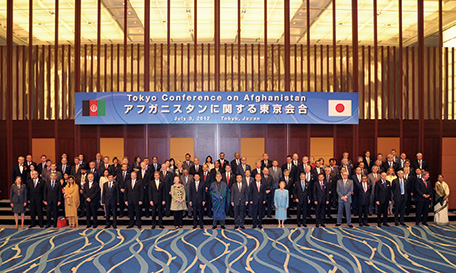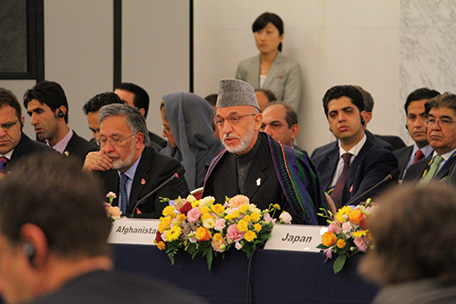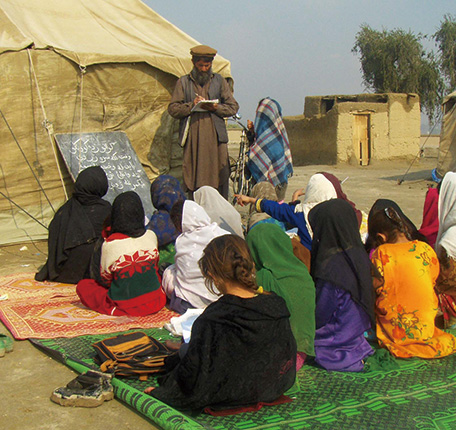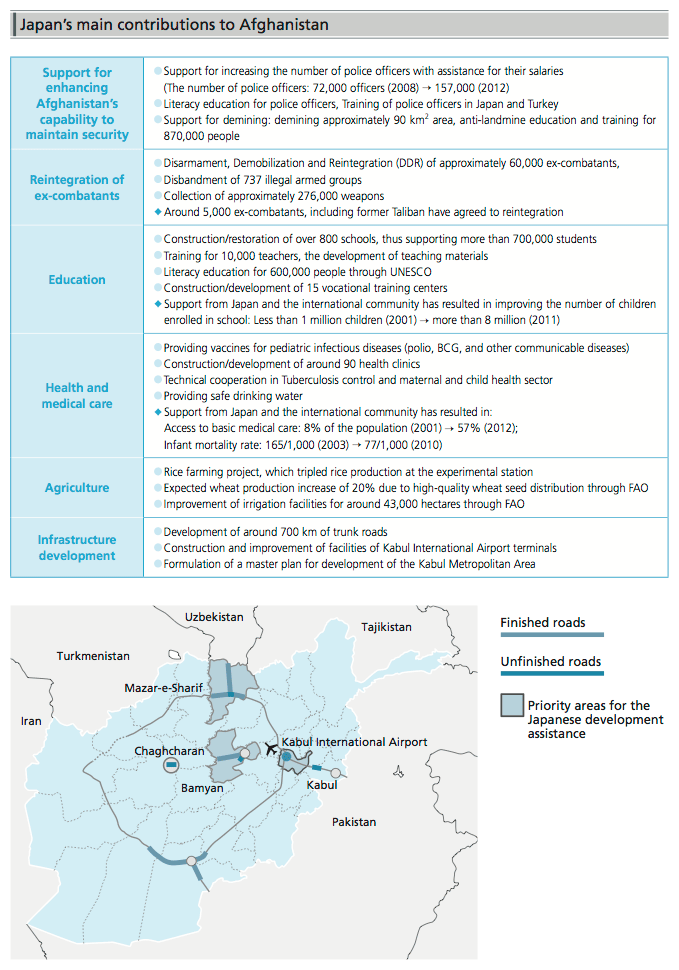Japan's Official Development Assistance White Paper 2012
ODA Topics
Tokyo Conference on Afghanistan
On July 8, 2012, the Japanese and Afghan Governments jointly held the Tokyo Conference on Afghanistan. Afghan President Hamid Karzai, UN Secretary-General Ban Ki-Moon and then-U.S. Secretary of State Hillary Clinton were among representatives from 55 countries and 25 international organizations and civil societies who participated in the conference, and together the international community committed to supporting development efforts of Afghanistan towards its self-reliance throughout the Transformation Decade* (2015–2024). The aim of the Conference was to deliver the message that the international community would not abandon Afghanistan in 2015 and beyond by demonstrating the international community's strong commitment for the cooperation.
* At the Bonn Conference in Bonn, Germany in December 2011, the international community named the 10 years beginning at the end of 2014 upon the complete transfer of security responsibility in Afghanistan from the International Security Assistance Force (ISAF) to Afghanistan the "Transformation Decade" and agreed to forge a new and deeper cooperative relationship between the international community and Afghanistan.
1. Aim of Tokyo Conference
A look into recent history will shed light on what is behind the message that the international community will not abandon Afghanistan. In the middle of the Cold War in 1979, the former Soviet Union invaded Afghanistan and established a communist government there. However, the international community's interest in Afghanistan waned following the end of the Cold War. The Soviet Union collapsed in 1991, and the Mujahideen (Islamist volunteer soldiers who fought against the Soviet Union during the invasion) toppled the communist government in 1992. The ensuing power struggle between parties in Afghanistan dragged the country into a civil war, and the Taliban gained power in 1996, resulting in a country led by extreme Islamic fundamentalists that would become home to the international terrorist organization Al-Qaeda. These historical events led to the tragic terrorist attacks of September 11, 2001. Looking back, we can see that the international community's declining interest in Afghanistan at the end of the Cold War and upon the collapse of the Soviet Union likely played a part in the expansion of the Taliban and other terrorist organizations.
Afghanistan is currently in the process of transferring the responsibility of security in Afghanistan from ISAF to the Afghanistan government with the goal of completing the transition process and the ISAF withdrawal by the end of 2014. Learning from the aftermath of the Cold War, the international community appealed in this conference to the people of Afghanistan and to armed anti-government groups by expressing its intent to continue to support Afghanistan after the transition, in 2015 and beyond, so that neither the Taliban nor any other terrorist organizations will emerge there again.

Representatives from 55 countries and 25 international organizations and civil societies participated in the conference.
2. Outcome of Tokyo Conference Results
At Tokyo Conference to express that commitment in concrete terms, the Tokyo Mutual Accountability Framework (Tokyo Framework) was established, which clarifies the individual responsibilities of the international community and the Afghanistan government and regularly examines and verifies those responsibilities. The Afghanistan government committed to carry out its growth and development strategies over the Transformation Decade effectively with transparency and to improve certainly its governance. In turn, the international community pledged to provide over $16 billion to fulfill the needs of the Afghanistan government with respect to its growth and development strategies. All agreed to hold biannual ministerial-level meetings to verify these commitments and responsibilities.
3. Japan's Contributions
As a responsible member of the international community, Japan took the lead and announced to provide up to around $3 billion of assistance in about five years from 2012 in the fields of socio-economic development and enhancement of security capacity. Japan focuses on three major areas in the development field with respect to the Afghanistan government's growth and development strategies: agricultural and rural development, infrastructure development, and human resources development. Afghanistan is a landlocked country, therefore promoting trade with neighboring countries is an important part of stimulating growth in Afghanistan. Based on that notion, Japan announced to implement projects worth around $1 billion in neighboring countries such as Pakistan and other Central Asian countries and, through these projects, it would assist construction of a corridor that goes across Afghanistan from Central Asia to Karachi, Pakistan. The Tokyo Conference established a framework for the sustainable growth of Afghanistan from 2015 and beyond, and many nations and conference participants hold Japan's efforts and contributions along with its financial cooperation in the highest regard. (See the illustration, "Japan's main contributions to Afghanistan")
4. Results and Future of Support
The Tokyo Conference was held at a critical juncture, 10 years after the 2002 International Conference on the Reconstruction of Afghanistan in Tokyo following the collapse of the Taliban regime in 2001. Support from the international community made significant results over that decade. Primary school enrollment was only 1 million in 2001, but that number grew to 8 million by 2011. Less than 10% of the population had access to primary health care in 2001, and by 2011 that figure had increased to 57%. These factors help ensure human security.
In light of these results, to prevent Afghanistan from stepping back to a hotbed of terrorism, the international community must steadily progress the transfer of security responsibility to the Afghanistan government and support its efforts toward self-reliance from 2015 and beyond.

Many important people from around the world, including Afghanistan President Hamid Karzai, attended.

Elementary school students in Deh Sabz District, Kabul Province, Afghanistan studying outside because of lack of a school building (Photo: Sayad Jan Sabawoon /JICA)

